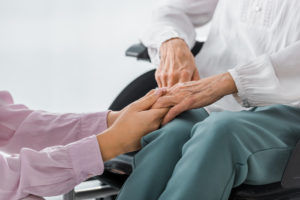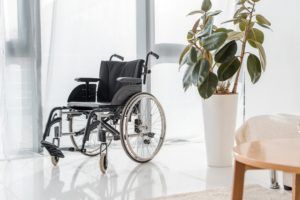Oakland Nursing Home Abuse
Nursing home abuse is one of the most egregious crimes imaginable. Whenever individuals take advantage of people who cannot defend themselves, the crime becomes even more unforgivable. Our valued elderly population in Oakland is completely at the mercy of nursing homes and other care giving staff. While many of these nursing homes might operate in an ethical, responsible manner, there are always exceptions. The truth of the matter is that it is easy to abuse elderly people who may be weak, frail, and confused. This is why our elder loved ones need our vigilance and care in protecting them from elder abuse.
Fortunately, you have the ability to hold abusers of the elderly accountable. Connect with a qualified, experienced personal injury attorney in Oakland, and you can take negligent nursing homes to court. These legal experts can help you recover compensation for your damages, whether you have suffered personally or you have a loved one who is in a nursing home. It is always a good idea to enlist the help of a firm that specializes in nursing home abuse, such as Mary Alexander & Associates.
What is Nursing Home Abuse?
Nursing home abuse can be defined as any type of harm experienced by residents of long-term care facilities. Abuse can be physical, emotional, sexual, financial, or mental. There is an incredibly wide range of potential abuse that a resident might suffer, although abuse almost always stems from nursing home staff. That being said, the overall operation and administration of nursing homes can also be abusive. Often, this is the result of mega healthcare corporations who cut corners and create unsafe environments for the sake of increased profits.
What Protections Does California Offer?
California has its own set of laws that protect elders. These laws are laid out in California Penal Code 368. Here is a quick rundown on the rights and protections with which California provides elderly individuals in nursing homes:
- Anyone who “willfully causes or permits any elder or dependent adult to suffer” (including physical pain or mental suffering) faces up to four years in prison and a $6,000 fine.
- If someone tries to steal from an elderly individual (including embezzlement, forgery, and fraud) faces fines of up to $10,000 and a prison sentence of four years.
- A person who commits false imprisonment against an elder faces four years in prison.

In addition to Penal Code 368, California also has another set of rules laid out in the Elder Abuse Act. These laws offer further protections to nursing home residents in California. Here is a brief rundown of the protections offered by the Elder Abuse Act:
- Anyone responsible for the care of an elderly person must report any instances of abuse as soon as possible, even if they merely suspect abuse.
- If the abuse is physical in nature, they must call law enforcement officials immediately. They must report this abuse within two hours of becoming aware of it.
- If the abuse does not cause a “serious bodily injury,” they have 24 hours to report the abuse to a law enforcement agency.
- If someone responsible for the care of an elderly person fails to report instances of real or suspected abuse, they face a jail sentence of up to one year and a fine of up to $5,000.
What Rights Do Nursing Home Residents Have?
In addition to the laws and regulations outlined above, nursing home residents in Oakland are also guaranteed a number of inalienable rights. It is important to understand these rights, and when they have been violated. If they have been violated, you may be able to pursue legal action against those responsible.
- Grievances: You have the right to voice any grievances you might have, including those related to changes in policies, services, and staff.
- Treatment: You have the right to be kept informed about your medical conditions and treatment plans. You have the right to self-administer medications if possible. You have the right to choose your physician, and you have the right to refuse treatment that is experimental in nature.
- Protection of Funds: You have the right to manage your own finances. You have the right to be informed when your account goes below the Medi-Cal resource limit ($2,000).
- Transfers and Discharges: You have the right to be transferred or discharged if you have sufficiently recovered. You can only be discharged or transferred if your needs cannot be met in your current facility, the health of other people has become endangered, you can longer pay for your healthcare, or the facility has shut down.
- Restraints and Abuse: You have the right to be free from verbal, sexual, physical, and mental abuse. You cannot be subjected to involuntary seclusion, chemical or physical restraints, including unnecessary and antipsychotic drugs.
- Privacy: You have the right to confidentiality when it comes to your medical records. You have the right to access your unopened mail, make private phone calls, and meet privately with people from outside and inside the facility.
- Free Choice: You have the right to choose your own schedules and participate in activities of your choosing. You have the freedom to wear your own personal clothing.
- Visitation: The facility cannot deny you the right to be visited by your family and relatives.
 Filing a Lawsuit
Filing a Lawsuit
While criminal action can put negligent individuals behind bars for abusing elderly people, victims may still require compensation for their damages. These individuals may be suffering from a wide range of both economic and non-economic damages, including new medical bills and emotional trauma. Filing a lawsuit against the negligent party is the best way to receive compensation for these damages.
In the event that your loved one has passed away while staying at a nursing home in Oakland, you can file a wrongful death claim and receive compensation from those responsible. This can be helpful when dealing with funeral costs and other unforeseen expenses, as well as non-economic damages.
What Do I Need to Prove?
In order to win a personal injury lawsuit of any kind, you need to establish negligence. This is the most difficult aspect of a personal injury lawsuit, and your attorney will have to approach this process carefully. There are four elements of negligence that you will need to prove:
- Duty: Did the negligent party owe a duty of care to the plaintiff? In the case of a nursing home abuse lawsuit, the answer is almost always “yes.”
- Breach: Did the defendant fail in their duty of care?
- Causation: Did the defendant’s failure to provide a duty of care lead directly to injuries suffered by the plaintiff?
- Damages: Did the plaintiff actually suffer any damages? How much are these damages worth, and what type of damages did they suffer?
If your attorney can establish all of the four elements of negligence, you will receive compensation for your damages.
Reach Out to Mary Alexander & Associates Today
We understand that dealing with nursing home abuse can be stressful and upsetting. Reach out to Mary Alexander & Associates at your earliest convenience, and we can help you take your next steps in an efficient, stress-free manner. With the assistance of a skilled attorney, filing a lawsuit does not have to be complicated or worrying. Rely on us to hold these negligent individuals accountable, and you can concentrate on recovering from this traumatic experience. Book a consultation today, and we will fight for justice on your behalf.


 Filing a Lawsuit
Filing a Lawsuit